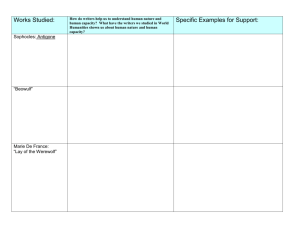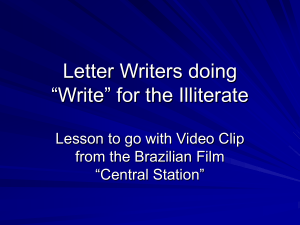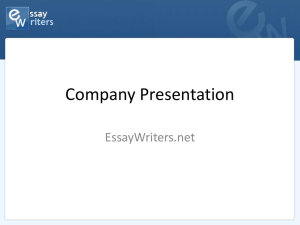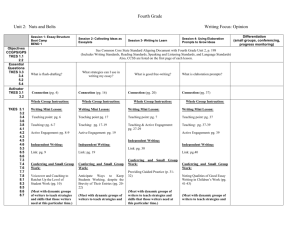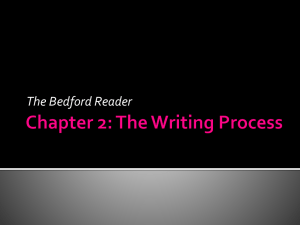Sixth Grade Unit 3: Research-Based Information Writing Writing
advertisement
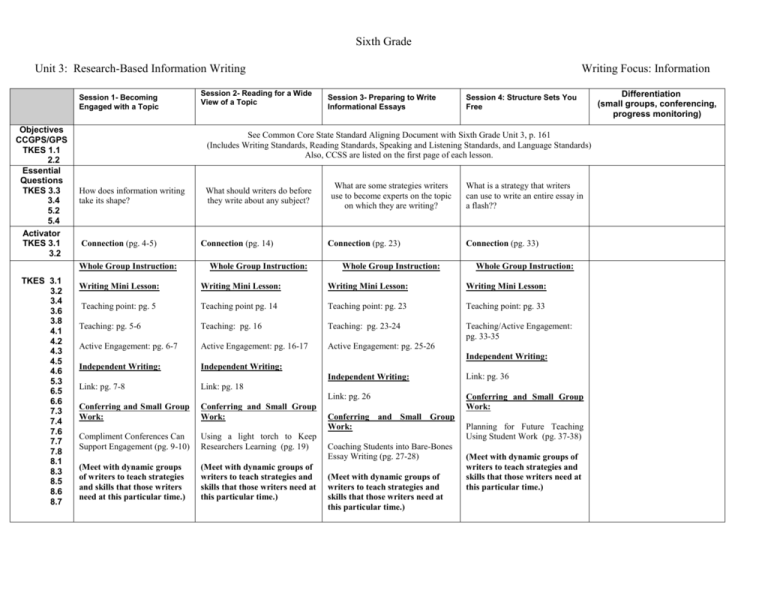
Sixth Grade Unit 3: Research-Based Information Writing Session 1- Becoming Engaged with a Topic Objectives CCGPS/GPS TKES 1.1 2.2 Essential Questions TKES 3.3 3.4 5.2 5.4 Activator TKES 3.1 3.2 Session 3- Preparing to Write Informational Essays Session 4: Structure Sets You Free See Common Core State Standard Aligning Document with Sixth Grade Unit 3, p. 161 (Includes Writing Standards, Reading Standards, Speaking and Listening Standards, and Language Standards) Also, CCSS are listed on the first page of each lesson. How does information writing take its shape? Connection (pg. 4-5) Whole Group Instruction: TKES 3.1 3.2 3.4 3.6 3.8 4.1 4.2 4.3 4.5 4.6 5.3 6.5 6.6 7.3 7.4 7.6 7.7 7.8 8.1 8.3 8.5 8.6 8.7 Session 2- Reading for a Wide View of a Topic Writing Focus: Information What should writers do before they write about any subject? Connection (pg. 14) Whole Group Instruction: What are some strategies writers use to become experts on the topic on which they are writing? Connection (pg. 23) Whole Group Instruction: What is a strategy that writers can use to write an entire essay in a flash?? Connection (pg. 33) Whole Group Instruction: Writing Mini Lesson: Writing Mini Lesson: Writing Mini Lesson: Writing Mini Lesson: Teaching point: pg. 5 Teaching point pg. 14 Teaching point: pg. 23 Teaching point: pg. 33 Teaching: pg. 5-6 Teaching: pg. 16 Teaching: pg. 23-24 Teaching/Active Engagement: pg. 33-35 Active Engagement: pg. 6-7 Active Engagement: pg. 16-17 Active Engagement: pg. 25-26 Independent Writing: Independent Writing: Link: pg. 7-8 Link: pg. 18 Conferring and Small Group Work: Conferring and Small Group Work: Compliment Conferences Can Support Engagement (pg. 9-10) Using a light torch to Keep Researchers Learning (pg. 19) (Meet with dynamic groups of writers to teach strategies and skills that those writers need at this particular time.) (Meet with dynamic groups of writers to teach strategies and skills that those writers need at this particular time.) Independent Writing: Independent Writing: Link: pg. 36 Link: pg. 26 Conferring and Small Group Work: Conferring and Small Group Work: Coaching Students into Bare-Bones Essay Writing (pg. 27-28) (Meet with dynamic groups of writers to teach strategies and skills that those writers need at this particular time.) Planning for Future Teaching Using Student Work (pg. 37-38) (Meet with dynamic groups of writers to teach strategies and skills that those writers need at this particular time.) Differentiation (small groups, conferencing, progress monitoring) Mid-Workshop Teaching: Summarizer TKES 5.2 6.7 7.5 7.7 Mid-Workshop Teaching: Pause Early to Organize Notes (pg. 9) Mid-Workshop Teaching: Mid-Workshop Teaching: Writing While Reading to Learn (pg. 19) Illustrating Patterns that Apply to Many Cases in Point (pg. 27) Workshop Share: Workshop Share: Workshop Share: Workshop Share: Following a Topic (pg. 11) A Dual Learning Focus (pg. 20) Using Partners as Resource for Feedback (pg. 39) Homework: Homework: Creating Parallel Key Points for a Topic and Evidence to Go With It. (pg. 29-31) Continuing Your Research. (pg. 12) Focusing On How Topic Pieces Fit Together To Create A Whole (pg.21) Homework: Observation Performance Task/Rubric Assessment Summative TKES 5.4 6.3 6.5 6.6 Coach Writers to Refer to and Cite Text Evidence (pg. 37) Formative Homework Assignment Homework: Continuing To Write and Research, Locating Evidence To Develop Key Points (pg. 31) Turning Feedback Into Quick Writing Goals (pg.40) End of Bend I Observation Observation Ob Observation Performance Task/Rubric Performance Task/ Rubric Performance Task/Rubric Summative Summative Summative Formative Formative Formative Homework Assignment Homework Assignment Homework Assignment Bend II Session 5- The Trail of Research Objectives CCGPS/GPS TKES 1.1 2.2 Essential Questions TKES 3.3 3.4 5.2 5.4 Activator TKES 3.1 3.2 TKES 3.1 3.2 3.4 3.6 3.8 4.1 4.2 4.3 4.5 4.6 5.3 6.5 6.6 7.3 7.4 7.6 7.7 7.8 8.1 8.3 8.5 8.6 8.7 Session 6- Envisioning Structures to Plan an Information Book Session 7- Constructing Texts with Solid Bricks of Information Session 8: Research See Common Core State Standard Aligning Document with Sixth Grade Unit 3, p. 161 (Includes Writing Standards, Reading Standards, Speaking and Listening Standards, and Language Standards) Also, CCSS are listed on the first page of each lesson. Why do writers need to ask themselves questions about their chosen topics? What strategies do writers use to come up with a plan for their information books/essays? What are “solid bricks of information”? Why do you need to write and read as you research? Connection (pg. 46) Connection (pg. 55) Connection (pg. 65) Connection Whole Group Instruction: Whole Group Instruction: Whole Group Instruction: Whole Group Instruction: Writing Mini Lesson: Writing Mini Lesson: Writing Mini Lesson: Writing Mini Lesson: Teaching point: pg. 45 Teaching point: pg. 55 Teaching point: pg. 65 Teaching point: pg. 74 Teaching: pg. 46 Teaching: pg. 55-56 Teaching: pg. 66-68 Teaching/Active Engagement: pg. 74-75 Active Engagement: pg. 47 Active Engagement: pg. 57-59 Active Engagement: pg. 68-69 Independent Writing: Independent Writing: Independent Writing: Link: Independent Writing: Link: pg. 47-48 Link: pg. 69 Link: pg. 59 Conferring and Small Group Work: Conferring and Small Group Work: Channel Coalition Groups to Pursue Trails of Inquiry (pg. 49-50) Conferring and Small Group Work: Imagining the Evolution of Your Teaching (pg. 60-61) Conferring and Small Group Work: Ways to Revise One Chapter and Plan Another (pg.70-71) (Meet with dynamic groups of writers to teach strategies and skills that those writers need at this particular time.) (Meet with dynamic groups of writers to teach strategies and skills that those writers need at this particular time.) (Meet with dynamic groups of writers to teach strategies and skills that those writers need at this particular time.) Mid-Workshop Teaching: Mid-Workshop Teaching: Mid-Workshop Teaching: Using Transition Words (pg. 70) Transferring Lesson Learned Earlier to this New Research (pg. 49) Revising Chapters for Structure (pg. 61-62) pg. 77 (Meet with dynamic groups of writers to teach strategies and skills that those writers need at this particular time.) Mid-Workshop Teaching Not All Sources Can Be Trusted Equally (pg. 77-78) Differentiation (small groups, conferencing, progress monitoring) Workshop Share: Summarizer Charting a Research Trail (pg. 51) TKES Homework: 5.2 6.7 7.5 7.7 Workshop Share: Sharing Compliments and Suggestions for Revision (pg. 62). Workshop Share: Partners Teach Each Other Their New Chapters (pg. 72) Workshop Share: Talking about the information coalition groups have gathered (pg. 78) Homework: Writing Up A Storm (pg. 71) Continue Studying and Keep Following The trail of Research (pg. 52) Homework: Write A substantially Improved Draft (pg.63) Observation Observation Observation Assessment Performance Task/Rubric Performance Task/Rubric Performance Task/ Rubric Performance Task/Rubric TKES Summative Summative Summative Summative Formative Formative Formative Formative Homework Homework Homework 5.4 6.3 6.5 6.6 Session 9- Writing With Detail Objectives CCGPS/GPS TKES 1.1 2.2 Essential Questions TKES 3.3 3.4 5.2 5.4 Activator TKES 3.1 3.2 TKES 3.1 3.2 3.4 Session 10- Lifting the Level of Complexity Session 11- Using Text Features to Strengthen Writing Ob Observation Homework Session 12: Planning Ready-toGo Chapters See Common Core State Standard Aligning Document with Sixth Grade Unit 3, p. 161 (Includes Writing Standards, Reading Standards, Speaking and Listening Standards, and Language Standards) Also, CCSS are listed on the first page of each lesson. What are some strategies writers use to help readers understand what they are trying to teach? How can writers make texts more authoritative and academic? What are the text features that nonfiction writers include and what is each one used for? Connection (pg.80) Connection (pg. 90) Connection (pg. 100) Whole Group Instruction: Writing Mini Lesson: Whole Group Instruction: Writing Mini Lesson: Whole Group Instruction: Writing Mini Lesson: What can a writer do if he has to write a ready to go chapter to help him in the writing process? Connection (pg. 111) Whole Group Instruction: Writing Mini Lesson: Differentiation (small groups, conferencing, progress monitoring) 3.6 3.8 4.1 4.2 4.3 4.5 4.6 5.3 6.5 6.6 7.3 7.4 7.6 7.7 7.8 8.1 8.3 8.5 8.6 8.7 Teaching point: pg. 81 Teaching point. pg. 90 Teaching point: pg. 101 Teaching point: pg. 111 Teaching: pg. 81-82 Teaching: pg. 91-92 Teaching/Active Engagement: pg. 101-103 Teaching/Active Engagement: pg. 111-113 Active Engagement: pg. 82-83 Active Engagement: pg.92 Independent Writing: Independent Writing: Independent Writing: Independent Writing: Link: pg. 103-105 Link: pg. 114 Link: pg. 83-84 Link: pg. 93 Conferring and Small Group Work: Revising by Rereading through Particular Lenses.(pg. 85-86) Conferring and Small Group Work: Conferring and Small Group Work: Conferring and Small Group Work: A repertoire of Further, Related Teaching Points (pg. 106-107) Support Trying More Than One Structure. (pg. 115-117) (Meet with dynamic groups of writers to teach strategies and skills that those writers need at this particular time.) (Meet with dynamic groups of writers to teach strategy and skills that those writers need at this particular time.) Mid-Workshop Teaching: A Well-placed Text Feature Is Worth a Thousand Words (pg. 106) Mid-Workshop Teaching: Crafting Introductions that Frame Each Chapter (pg. 115-116) Workshop Share: Editing with Partners Using A Checklist. (pg. 96) Workshop Share: A Text-Feature Gallery Walk (pg. 108) Workshop Share: Homework: Finalizing Drafts (pg.97) Homework: Revise Text Features and Plan a New Chapter (pg. 109) (Meet with dynamic groups of writers to teach strategies and skills that those writers need at this particular time.) Varying Sentence Length (pg. 94-95) (Meet with dynamic groups of writers to teach strategies and skills that those writers need at this particular time.) Mid-Workshop Teaching: Mid-Workshop Teaching: Bringing Out the Words That People Say. (pg. 86) Workshop Share: Summarizer TKES 5.2 6.7 7.5 7.7 Assessment TKES 5.4 6.3 6.5 6.6 Writers Hold Themselves to High Standards as They SelfAssess. (pg. 87) Pronoun Agreement (pg. 94) Homework: Make Decisions About Writing and Revising.(pg. 88) Writing an Introduction to the Whole Book (pg. 118) Homework: Finish Introductions and Do More Research For a Ready-ToGo Draft Observation Observation Observation Ob Observation Performance Task/Rubric Performance Task/Rubric Performance Task/ Rubric Performance Task/Rubric Summative Summative Summative Summative Formative Formative Formative Homework Homework Homework Homework Session 13: Quoting with a Purpose In Mind Objectives CCGPS/GPS TKES 1.1 2.2 Essential Questions TKES 3.3 3.4 5.2 5.4 Activator TKES 3.1 3.2 TKES 3.1 3.2 3.4 3.6 3.8 4.1 4.2 4.3 4.5 4.6 5.3 6.5 6.6 7.3 7.4 7.6 7.7 7.8 8.1 8.3 8.5 8.6 8.7 Session 14: Celebrating With A Book Exhibit Tour Session 15: Studying Digital Mentor Texts Session 16: Revising to Fit Digital Formats See Common Core State Standard Aligning Document with Sixth Grade Unit 3, p. 161 (Includes Writing Standards, Reading Standards, Speaking and Listening Standards, and Language Standards) Also, CCSS are listed on the first page of each lesson. What are some reasons writers use meaningful quotations in their texts? Why is it important to give writers precise, concrete feedback? Connection (pg.121) Connection (pg. 130) Whole Group Instruction: Whole Group Instruction: How do writers get insights for new writing projects? Connection: (pg. 136) Whole Group Instruction: What changes does a writer make when presenting his work within the constraints of digital formats? Connection: (pg. 145) Whole Group Instruction: Writing Mini Lesson: Writing Mini Lesson: Writing Mini Lesson: Writing Mini Lesson: Teaching point: pg. 121 Teaching point Teaching point pg. 136 Teaching point pg. 145 Teaching: pg. 122-123 Teaching/Active Engagement: pg. 129-131 Teaching: pg. 136-138 Teaching: pg. 145-148 Active Engagement: pg. 138 Active Engagement: pg. 148 Independent Writing: Independent Writing: Link: pg. 139 Link: pg. 149 Active Engagement: pg. 123124 Independent Writing: Independent Writing: Link: Link: pg. 124 Conferring and Small Group Work: Conferring and Small Group Work: Conferring and Small Group Work: (pg. 131) Weaving Quotations into Writing with Transitional Phrases (pg. 125-126) (Meet with temporary groups of writers to teach strategies and skills that those writers need at this particular time.) (Meet with temporary groups of writers to teach strategies and skills that those writers need at this particular time.) Coaching Writers to Glean More from Mentor Texts (pg. 140-141) Meet with temporary groups of writers to teach strategies and skills that those writers need at this particular time.) Conferring and Group Work: Small Coaching Students to Tackle Planning Challenges (pg. 149) Differentiation (small groups, conferencing, progress monitoring) Mid-Workshop Teaching: Mid-Workshop Teaching: Not Just Leading into quotations: Leading out of Quotations (pg. 125) Workshop Share: Summarizer TKES 5.2 6.7 7.5 7.7 Introducing the Source and Explaining the Tie-In (pg.127128) Workshop Share: (pg. 131-132) Mid-Workshop teaching: Planning for Websites and Digital Slide Show Presentations (pg. 140) Creating Plans that Have a Logical Flow (pg. 150) Workshop Share: Workshop Share: Putting Extra Information into Presentation Notes. (pg. 151) Relying on Partnerships to Strengthen Prototypes ( pg. 142) Homework: End of Bend II Homework: Polishing Writing As A Way To Go Public Observation Mid-Workshop Teaching: Homework: Finish Revising Planning Pages. (pg. 151) Deciding On A Digital Project and Completing A Prototype (pg. 143) Observation Observation Observation Assessment TKES 5.4 6.3 6.5 6.6 Performance Task/Rubric Performance Task/Rubric Performance Task/Rubric Performance Task/ Rubric Summative Summative Summative Summative Formative Formative Formative Formative Homework Homework Homework Homework Session 17: Pouring into Digital Forms… and Publishing Objectives CCGPS/GPS TKES 1.1 2.2 Essential Questions TKES 3.3 3.4 5.2 5.4 Activator TKES 3.1 3.2 TKES 3.1 3.2 3.4 3.6 3.8 4.1 4.2 4.3 4.5 4.6 5.3 6.5 6.6 7.3 7.4 7.6 7.7 7.8 8.1 8.3 8.5 8.6 8.7 Summarizer TKES 5.2 6.7 7.5 7.7 Session 18: Celebration See Common Core State Standard Aligning Document with Sixth Grade Unit 3, p. 161 (Includes Writing Standards, Reading Standards, Speaking and Listening Standards, and Language Standards) Also, CCSS are listed on the first page of each lesson. What are some reason to publish your work online? What are the protocols for today’s formal presentations? Whole Group Instruction: Whole Group Instruction: Writing Mini Lesson: Writing Mini Lesson: (pg. 157) Teaching point: Teaching point: Teaching: pg. Teaching: pg. Active Engagement: pg. 153 Active Engagement: Conferring and Small Group Work: Conferring and Small Group Work: pg. 157 (Meet with temporary groups of writers to teach strategies and skills that those writers need at this particular time.) Workshop Share: (pg. 157) End of Bend III Observation Assessment Performance Task/Rubric TKES 5.4 6.3 6.5 6.6 Summative Formative Final Formative Writing Piece- Information


